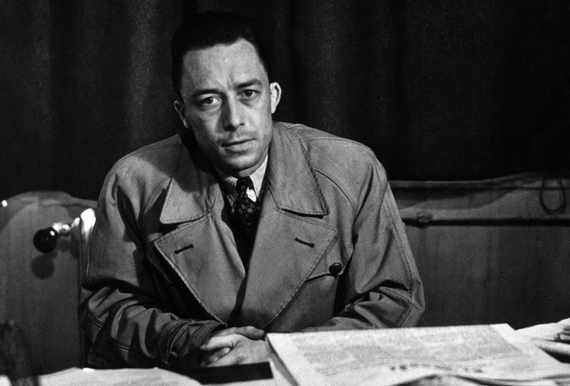When Johnny Depp raises a wry eyebrow on screen, it's an "existential performance." When Donald Rumsfeld spoke of "unknown unknowns," it was existential poetry. Though many politicians and entertainers welcome the label, now applied so loosely, Camus certainly did not. Even so, many journalists and commentators have inaccurately identified him as an existentialist. What in the name of Nietzsche is going on?
In 1945 Camus said point-blank: "I am not an existentialist... Sartre and I are always surprised to see our names linked." In fact, he went so far as to claim that The Myth of Sisyphus was "directed against" the movement. He compared it to "philosophical suicide" - causing followers to "deify what crushes them," in effect turning negation into a religion.
Camus in turn had a religion of his own: a quasi-pagan, Greek reverence for nature itself. Case in point: Sisyphus, his hero of the absurd. Condemned to push a heavy rock up a hill for eternity, only to watch it roll down each time into the valley below, Sisyphus achieves a serene unity with the physical world: "The cheek tight against the stone, the shoulder bracing the clay-covered mass, the foot wedging it, the fresh start with arms outstretched, the wholly human security of two earth-clotted hands." In Camus' version of the myth, Sisyphus is happy.
If Jean-Paul Sartre had written this essay, Sisyphus would have experienced "nausea" as he contemplated the puzzling substantiality (the "being-in-itself") of the rock.
Though Camus is invariably linked with Sartre, whose name is synonymous with existentialism, they were an odd couple who clashed like Voltaire and Rousseau or Verlaine and Rimbaud. Sartre was tiny, plump and ugly; Camus tall, elegant and handsome. Sartre played Quasimodo to Camus' Humphrey Bogart. Sartre famously described man as a useless passion; Camus described himself as a man of passion. Sartre felt most at home in the dark cafés of Paris; Camus in the blazing sunlight of the Algeria of his childhood. Sartre wrote at Mozart speed; Camus at Beethoven's tortured pace.
So what is existentialism, and why does Camus not qualify? In simple terms, Sartre believed that existence precedes essence; Camus that essence precedes existence. In Sartre's bleak cosmos, man first becomes conscious of his existence as a free agent, condemned to forge his own identity -- his essence -- in a world unprotected by god. Camus, on the other hand, was willing to posit principles as absolute "essences," among them a belief that almost all violence is immoral. Therein lies the foul: Preconceived dogma, no matter how well intentioned, is not "existential."
The political differences of the two philosophers spilled into public view in 1952 in the pages of Sartre's newspaper, Les Temps Modernes. Camus regarded existentialism as the harsh extension of a Teutonic tradition stretching from Hegel to Marx, reaching a perverse conclusion in Stalin's labor camps. He decried dialectical materialism, and its use to "authorize any excess" in the quest for a classless society generations hence. In his view, there were no privileged executioners.
In his fashion, Sartre also opposed Stalin's methods -- while at the same time claiming that mass imprisonment in the Soviet Union was not as bad as one lynching in the United States. He objected, however, to the exploitation of the camps by the "bourgeois press" to fuel their anti-communist propaganda.
After Camus's taunt that Sartre was a detached intellectual who merely pointed his armchair at history, Sartre stabbed back: "My dear Camus: our friendship was not easy, but I will miss it... I don't dare advise you to go back to Being and Nothingness, since reading it would be needlessly difficult for you... You are only half-alive among us." Privately, Sartre characterized Camus as "a kind of schoolteacher, worthless in philosophy."
Whew. I sum it up this way: Camus was a poet who wished he could be an influential thinker; Sartre a deep thinker who wished he could attain the eloquence of a poet. Camus stumbled with logic, and Sartre with words, as anyone who has tried to read either closely will quickly discover. Yet only one of them was an existentialist.
Sources:
"I am not an existentialist": Interview in Les Nouvelles Littéraires, November 15, 1945.
Albert Camus, The Myth of Sisyphus. 1983. New York: Vintage, pp. 41, 32, 120.
"Bourgeois Press": Olivier Todd, Albert Camus: A Life. 1997. New York: Knopf. p. 309.
"My Dear Camus" and "kind of schoolteacher": Todd, pp. 308 - 310.
